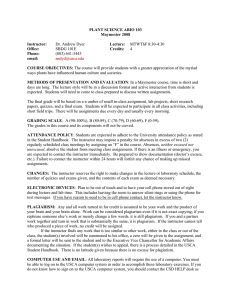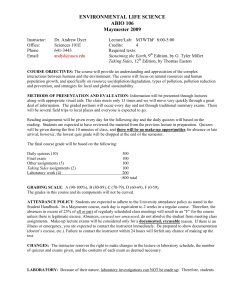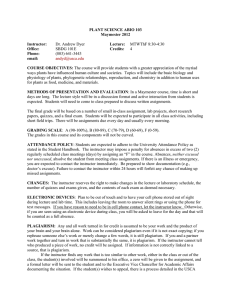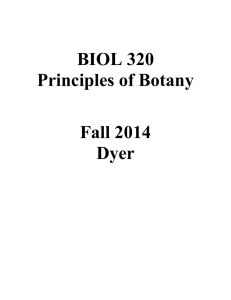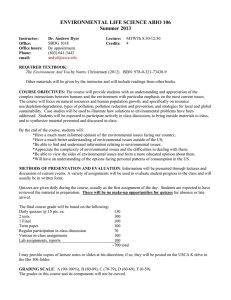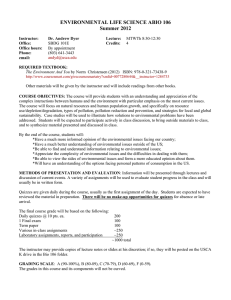ENVIRONMENTAL LIFE SCIENCE ABIO 106 Summer II 2011
advertisement
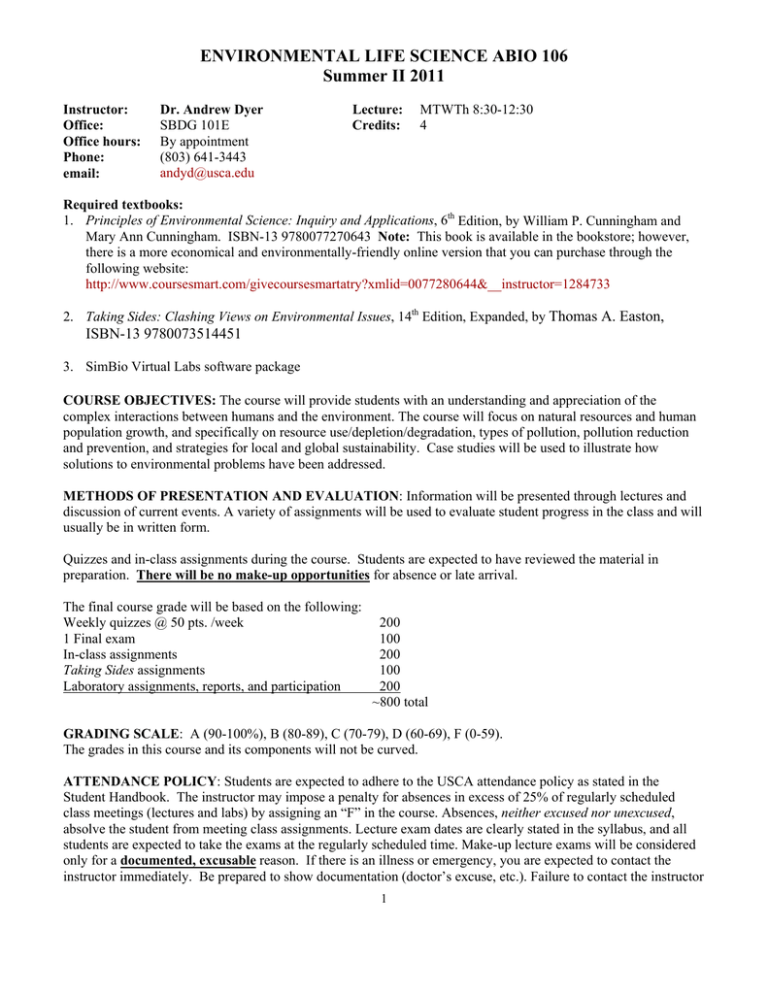
ENVIRONMENTAL LIFE SCIENCE ABIO 106 Summer II 2011 Instructor: Office: Office hours: Phone: email: Dr. Andrew Dyer SBDG 101E By appointment (803) 641-3443 andyd@usca.edu Lecture: Credits: MTWTh 8:30-12:30 4 Required textbooks: 1. Principles of Environmental Science: Inquiry and Applications, 6th Edition, by William P. Cunningham and Mary Ann Cunningham. ISBN-13 9780077270643 Note: This book is available in the bookstore; however, there is a more economical and environmentally-friendly online version that you can purchase through the following website: http://www.coursesmart.com/givecoursesmartatry?xmlid=0077280644&__instructor=1284733 2. Taking Sides: Clashing Views on Environmental Issues, 14th Edition, Expanded, by Thomas A. Easton, ISBN-13 9780073514451 3. SimBio Virtual Labs software package COURSE OBJECTIVES: The course will provide students with an understanding and appreciation of the complex interactions between humans and the environment. The course will focus on natural resources and human population growth, and specifically on resource use/depletion/degradation, types of pollution, pollution reduction and prevention, and strategies for local and global sustainability. Case studies will be used to illustrate how solutions to environmental problems have been addressed. METHODS OF PRESENTATION AND EVALUATION: Information will be presented through lectures and discussion of current events. A variety of assignments will be used to evaluate student progress in the class and will usually be in written form. Quizzes and in-class assignments during the course. Students are expected to have reviewed the material in preparation. There will be no make-up opportunities for absence or late arrival. The final course grade will be based on the following: Weekly quizzes @ 50 pts. /week 1 Final exam In-class assignments Taking Sides assignments Laboratory assignments, reports, and participation 200 100 200 100 200 ~800 total GRADING SCALE: A (90-100%), B (80-89), C (70-79), D (60-69), F (0-59). The grades in this course and its components will not be curved. ATTENDANCE POLICY: Students are expected to adhere to the USCA attendance policy as stated in the Student Handbook. The instructor may impose a penalty for absences in excess of 25% of regularly scheduled class meetings (lectures and labs) by assigning an “F” in the course. Absences, neither excused nor unexcused, absolve the student from meeting class assignments. Lecture exam dates are clearly stated in the syllabus, and all students are expected to take the exams at the regularly scheduled time. Make-up lecture exams will be considered only for a documented, excusable reason. If there is an illness or emergency, you are expected to contact the instructor immediately. Be prepared to show documentation (doctor’s excuse, etc.). Failure to contact the instructor 1 within 24 hours will forfeit any chance of making up the test. Attending lecture and taking notes is the sole responsibility of the student. Under no circumstance will the instructor provide copies of lecture notes or slides for students. CHANGES: The instructor reserves the right to make changes in the lecture or laboratory schedule, the number of quizzes and exams given, and the contents of each exam as deemed necessary. LABORATORY ATTENDANCE: Because labs are often group efforts and often require special instruction, some laboratory investigations cannot be made up. Therefore, students must make every effort to attend laboratory sessions. If you miss a laboratory investigation, you will not be allowed to take the associated quizzes or turn in a lab report the following week even if you get the information from your lab partners. This also applies if you come in late, leave early, or do not participate fully. You cannot write a report on a laboratory investigation that you did not do. ELECTRONIC DEVICES: Plan to be out of touch and to have your cell phone stored out of sight during lecture and lab time. This includes leaving the room to answer silent rings or using the phone for text messages. If you have reason to need to be in cell phone contact, let the instructor know. PLAGIARISM: Any and all work turned in for credit is assumed to be your work and the product of your brain and your brain alone. Work can be considered plagiarism even if it is not exact copying; if you rephrase someone else’s work or merely change a few words, it is still plagiarism. If you and a lab partner work together and turn in work that is substantially the same, it is plagiarism. If the instructor cannot tell who produced a piece of work, no credit will be assigned. If the instructor finds any work that is too similar to other work, either in the class or out of the class, the student(s) involved will be summoned to his office, a zero will be given to the assignment, and a formal letter will be sent to the student(s) and to the Executive Vice Chancellor for Academic Affairs documenting the situation. If the student(s) wishes to appeal, there is a process detailed in the USCA Student Handbook. There is no latitude given because there is no excuse for plagiarism. COMPUTER USE AND EMAIL: All laboratory reports will require the use of a computer. You must be able to log on to the USCA computer system in order to accomplish these laboratory exercises. If you do not know how to sign on to the USCA computer system, you should contact the CSD HELP desk as soon as possible. All official email communications, including class announcements, are made to USCA email accounts. Students should check their USCA email account on a regular basis and use this account for communication with the instructor. In order to protect the privacy of the student, the instructor will not reply to emails sent from non-USCA accounts (e.g., Hotmail, Yahoo, etc.). Also, because of federal law, no grades or scores can be communicated by phone or email; you must come to the instructor’s office. DISABILITY STATEMENT: If you have a physical, psychological, and/or learning disability which might affect your performance in this class, please contact the Office of Disability Services, 126A B&E, (803) 641-3609, as soon as possible. The Disability Services Office will determine appropriate accommodations based on medical documentation. CLASSROOM BEHAVIOR It is the instructor’s right to remove from the classroom any student who disrupts or disturbs the proceeding of the class. Disruption of the class includes but is not limited to the use of any portable electronic devices, including cell phones, MP3 players; iPods, etc. unless prior approval has been given to a student or unless required for the course. In extreme cases the faculty member can request assistance from University Police. If the student who has been ejected causes similar disturbances in subsequent meetings of the class, he/she may be denied admittance to the class for the remainder of the semester and assigned a grade of F. 2
